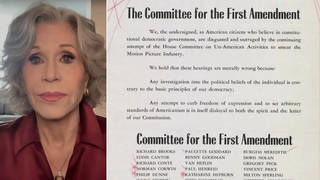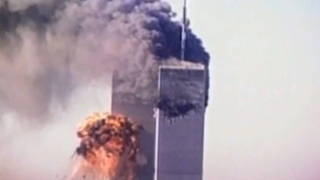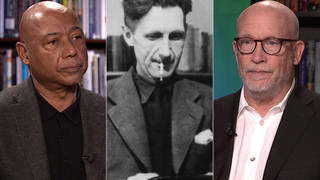
Guests
- Brian Knappenbergeraward-winning filmmaker and director of the Netflix docuseries Turning Point: 9/11 and the War on Terror.
- Mohammed Ali Naqviaward-winning Pakistani filmmaker and co-executive producer of the Netflix docuseries Turning Point: 9/11 and the War on Terror.
As this week marks the 20th anniversary of the 9/11 attacks on the World Trade Center in New York City and the Pentagon in Washington, D.C., we look at a new five-part documentary series on Netflix about the attacks and the response from the United States, both at home and abroad. “Turning Point: 9/11 and the War on Terror” features a wide range of interviews with survivors of the attacks, U.S. officials, former CIA members and veterans, as well as soldiers in the Afghanistan National Army, Taliban commanders, and Afghan officials, warlords and civilians. “What we really wanted to do was tell the story not just of what happened that day, but how we got there and where our response to those attacks took us as a country,” says director Brian Knappenberger. We also speak with co-executive producer Mohammed Ali Naqvi, an award-winning Pakistani filmmaker, who says the film was an attempt to go “beyond the binary narrative of good versus evil.”
Transcript
AMY GOODMAN: This week marks the 20th anniversary of the 9/11 attacks on the World Trade Center here in New York City and the Pentagon in Washington, D.C. We begin today’s show with a comprehensive five-part documentary series on Netflix that examines the attacks, as well as the response from the United States both at home and abroad. The film was released just after the Taliban seized power in Afghanistan, and it features a wide range of interviews with survivors of the attacks, U.S. officials, former CIA members and veterans, as well as soldiers in the Afghanistan National Army, Taliban commanders, Afghan officials, warlords and civilians. This is the trailer for Turning Point: 9/11 and the War on Terror.
MARILYN WILLS: It was a beautiful fall morning. There was the loudest noise I had ever heard.
JUDY WOODRUFF: Pieces of the story continue to come together. I have never seen anything like this.
ANDREW CARD: I whispered into the president’s ear, “America is under attack.”
REP. BARBARA LEE: I am convinced military action will not prevent acts of terrorism.
SOLDIER 1: Let me know where they’re shooting from!
SOLDIER 2: Keep moving! Keep moving!
THOMAS DRAKE: There’s before 9/11, and there’s after 9/11.
BRUCE HOFFMAN: In the 1990s, we were fixated on a new world order that would spread democracy throughout the world.
GARRETT GRAFF: 9/11 brought war home. It made America afraid.
THOMAS DRAKE: The NSA said take as much data as we can.
JAMES RISEN: This was the electronic version of an unauthorized government raid on your house.
ALBERTO GONZALES: The United States had to punish those responsible for these attacks.
DEXTER FILKINS: There was no higher mission than finding Osama bin Laden.
REP. ERIC CANTOR: The perpetrators of terrorism only understand the use of force.
CRAIG WHITLOCK: They knew all along these major problems that were going to prevent us from winning.
SOLDIER 3: No one even, like, really mentions 9/11 anymore. And to me, that’s the whole reason that I’m over here.
UNIDENTIFIED: Any power without constraint always leads to abuse.
REP. BARBARA LEE: September 11th changed the world. Let’s think through our actions today so that this does not spiral out of control.
AMY GOODMAN: The trailer for Turning Point: 9/11 and the War on Terror, a new Netflix five-part docuseries. We’re joined now by its director, Brian Knappenberger, the award-winning filmmaker, and co-executive producer Mohammed Ali Naqvi, the award-winning Pakistani filmmaker.
We welcome you both to Democracy Now! and welcome you back, Brian. Brian, let’s begin with you. This is deep. It is comprehensive. It starts with the attacks on 9/11 but then goes back in time and, of course, moves forward over these 20 years. You were among the last to interview members of the Afghan army, as well as the people who now comprise the inner circles of the Taliban leadership. Can you talk about the scope of this series and what you’re trying to do with it?
BRIAN KNAPPENBERGER: Yes, and thank you for having us on.
You know, I just thought that the 20th anniversary of 9/11 — I mean, what we really wanted to do was tell the story not just of what happened that day, but how we got there and where our response to those attacks took us as a country. You know, 9/11 was one of the most transformative geopolitical events of my life. And on the first anniversary of 9/11, I happened to be in Afghanistan creating one of my first films. I’ve always wanted to look in a big way at the war on terror, and particularly the War in Afghanistan.
And so, to do that, we go back in history. We start, essentially, with the Soviet invasion of Afghanistan, in which the — you know, with the CIA kind of creating a proxy war with the Soviets by supporting the mujahideen there. We look at the formation of al-Qaeda, the collapse, ultimately, of Afghanistan into a bloody civil war after the Soviets leave Afghanistan. We trace the increasing violent attacks of al-Qaeda throughout the ’90s. And we sort of frame all this also with firsthand accounts of people on the day of 9/11, what happened that day.
But I think primarily what we’ve looked at in the series is what comes next. So we trace the wars in Afghanistan and Iraq. We look at enhanced interrogation, or the torture program, as well as the effect of 9/11 on the United States — the rise of Islamophobia, mass suspicionless surveillance within the United States with programs like Stellar Wind. And so, we try to look at the full range of what 9/11 meant, both where it came from and what — the choices we made after 9/11, where that led us.
NERMEEN SHAIKH: Mohammed Ali Naqvi, if you could say a little bit more about the focus in the film, at least in the early parts of the film, on the effect of the Soviet occupation on what transpired in subsequent years? One of the points that the film makes is that it became very common in Muslim countries and among Afghans also to believe that the mujahideen actually fought the Soviets and defeated them, and this despite the fact that 2 million Afghan civilians were killed during the Soviet occupation. So, could you say what you think the significance of that has been?
MOHAMMED ALI NAQVI: Well, I think it’s highly significant in the sense that we got a chance to explore a narrative beyond the binary narrative of good versus evil that kind of existed post-9/11 and in the Bush-Cheney years, and we actually, as Brian was saying, got to look at how we got to this point. And one of the pivotal questions that the documentary asks us is: Why do they hate us? And I think the United States and other powers had a big hand in creating these mujahideen, in empowering them, in giving them weapons, in giving them a lot of money. So, I think no one really appreciated the effect that this was going to have later. And so, it was very important for us to definitely feature that and show that in the documentary and, you know, feature subjects like Gulbuddin Hekmatyar, for example, the Afghan warlord, or Younus Malkhan [phon.] and others, and the part that they played in, well, first of all, defeating the Soviets and then, of course, the implications of what was going to be the reaction of backing different types of warlords in Afghanistan and how that contributed to, you know, al-Qaeda joining up, for example, and the rise of the Taliban.
AMY GOODMAN: Mo, I wanted to play a few of the clips from the series because of the timeliness of this. In this clip, Turning Point: 9/11 and the War on Terror, we hear from the soldiers with the Afghan National Army.
GEN. YASIN ZIA: [translated] The only thing that exists is that the Taliban believe they have won this war, the United States is escaping, and they should be handed the keys to the door of this country, so they can come and establish their own emirate.
SGT. SUHAILA JAFARI: [translated] Even if the Americans withdraw their forces, we are prepared to fulfil our duties. We’ll be standing to defend our country as long as there’s blood in our bodies. We’re not going to surrender our country to the Taliban.
SGT. AHMAD FARHAD: This is our fight. This is my country. This is my people. This is my army. Remember this face. This is not the old Afghanistan. This is the new generation. This is the new people, the new young generation and the new army.
AMY GOODMAN: So, those are members of the Afghan army. This is another clip from Turning Point, former senior Taliban leader Jalaluddin Shinwari and former Afghan Vice President Ahmad Zia Massoud discussing what will happen after the U.S. departs Afghanistan.
AHMAD ZIA MASSOUD: [translated] The moment the Americans leave Afghanistan and their forces are not here, international terrorism will come back. And all that investment that has been made in Afghanistan over the last 19 years will all be gone.
JALALUDDIN SHINWARI: [translated] The Taliban logic and reason is that the government of Afghanistan is the outcome of the occupation of Afghanistan. When the Americans leave, the outcome of their occupation must be destroyed, too, and establish a new government that is acceptable for all the people of Afghanistan.
AMY GOODMAN: So, that is Taliban leader Jalaluddin Shinwari, who was one of the negotiators in Qatar with the United States, and then, before that, the former Afghan Vice President Ahmad Zia Massoud. Mohammed Naqvi, if you can talk about the circumstances of these interviews, when you did these? Because, of course, now deeply relevant, though they happened before the Taliban took over Afghanistan.
MOHAMMED ALI NAQVI: So, we were actually filming outside of the United States. We also filmed in Qatar and Doha, the negotiations themselves. And then, of course, we also filmed in Afghanistan and in Pakistan. And Ahmad Zia Massoud, we filmed in — I believe it was in November of 2020. And Jalaluddin Shinwari also, we filmed in November of 2020. So, this was in Kabul. And if you remember, at those times, the negotiations were still happening, and, in fact, the Taliban had gained major ground. And frankly, they were quite arrogant during their negotiations with the Afghan government, because they felt that they were in a position of power and they didn’t really have to concede much. And at that time, I think the U.S. was just trying to find a way out and just to exit. So this was around the time that we actually interviewed them.
AMY GOODMAN: And their comment, Brian Knappenberger, for example, Jalaluddin Shinwari saying, “We will destroy everything the U.S. left in Afghanistan”?
BRIAN KNAPPENBERGER: Yeah. Yeah, it’s so striking to hear that now. It was powerful at the time. And if you go back to that period of time that Mo was just describing, there was a lot of talk about, you know, a potential coalition kind of government, right? And our interview with him suggested something otherwise, that anything — that the outcome of their occupation, meaning the Afghan government, must also be destroyed. Those are chilling words and very striking up against the words of Massoud, who was sort of — I think, called it accurately, and then also the very moving interviews that we did with the Afghan soldiers, who it genuinely seemed were — felt like they could make a stand against the Taliban. So, that all — as you can imagine, all of that, those interviews, changed dramatically, almost by the week, right before we published the series on Netflix.
NERMEEN SHAIKH: Mohammed, could you talk about how you made the decision to interview people? How did you select the people to interview? I mean, this film has been receiving excellent reviews. It’s one of the top 10 viewed series on Netflix at the moment in the U.S. But one of the criticisms that’s been made is that the documentary focuses far too much on U.S. voices and only politicians in Afghanistan, not so much victims or survivors of the war in Afghanistan.
MOHAMMED ALI NAQVI: Well, for me, it was — this was quite a significant project to work on. I think when I met Brian and Eve — Eve, who is also — Eve Marson, who’s also an executive producer on the series — I immediately jumped at the chance, because a lot of my body of work was informed by 9/11. It was a very seminal event in my life. Being a Muslim American and being in New York at that time, it really informed the trajectory of the body of work that I was doing. And a lot of the work that I did do was specifically related to 9/11.
In this, I really wanted to look beyond just, you know, American voices, and I think Brian and the rest of the team were very amenable to my suggestions of actually featuring some Afghan voices, like Afghan warlords, like Gulbuddin Hekmatyar, and some of the politicians. But beyond that, we also featured voices such as the drone attack victims in Pakistan, in the KPK region, and, of course, a powerhouse member of Parliament and women’s rights activist Fawzia Koofi from the Afghan government. So, obviously, we did feature all those diverse voices, because we wanted to have a more robust and well-rounded picture of Afghanistan, and beyond even Afghanistan, just the region and in Pakistan, as well, and how American foreign policy affected them. And I would defer to Brian in terms of, like, just some of the editorial things.
NERMEEN SHAIKH: Brian, could you respond also to the question of how interviewees were selected?
BRIAN KNAPPENBERGER: Yeah, we — yeah, I guess I would push back on that a little, that I think we got a pretty wide range of interviews in Afghanistan. We were inside the peace talks at Doha. You know, we talked with the Taliban. We talked with Afghan civilians. Some were in Guantánamo Bay. Some were drone attack victims. We tried to get as broad a picture as we could from the Afghan side, too, including in the historical perspective, interviewing figures like Ismail Khan and Massoud and also Hekmatyar, things like that. So, I think we tried to get as broad a range as possible in the series, and that actually was a priority for us.
AMY GOODMAN: You know, something that didn’t get a lot of attention in the United States this week, as we come to the 20th anniversary of the 9/11 attacks, is what’s happening at Guantánamo.
BRIAN KNAPPENBERGER: Yeah.
AMY GOODMAN: The Guantánamo so-called trials. But I first want to go to a clip from Turning Point: 9/11 and the War on Terror that features the U.S. assistant attorney general from 2003 to ’04, Jack Goldsmith, talking about former Vice President Dick Cheney. The clip ends with Mark Fallon, former deputy commander of the Criminal Investigative Task Force at Guantánamo Bay.
JACK GOLDSMITH: Going back to the Ford White House, when Cheney was chief of staff, at least that far back, Dick Cheney developed a very robust view about the president’s powers under the Constitution, especially as those powers related to national security and war. And his basic view is that when it comes to war and national security, the president is in charge, and he can do what he thinks is necessary, and Congress basically can’t get in the way, and if Congress does get in the way, the president can ignore it. That was his legal view. It was an absolutist view of the president’s powers in wartime.
VICE PRESIDENT DICK CHENEY: So, it’s going to be vital for us to use any means at our disposal — disposal, basically, to achieve our objective.
MARK FALLON: That was frightening to me. It was frightening to hear the vice president of the United States, publicly, on a television show, where he should have been calming the nation down, where he should have been depressurizing, he was upping the pressure, upping the ante. And so I feared that we would do things that would be to our detriment.
AMY GOODMAN: So, you hear Vice President Dick Cheney, then that last voice, Mark Fallon, former deputy commander of the Criminal Investigative Task Force at Guantánamo Bay. This comes as the five men accused of plotting the September 11th attacks appeared in a Guantánamo Bay military court Tuesday for the first time in over a year. The resumption of the pretrial hearings comes just days ahead of the 20th anniversary of the attacks. The case against the five men includes suspected mastermind Khalid Sheikh Mohammed. It’s been riddled with procedural problems, including the admissibility of evidence that was obtained under torture by CIA agents. The pretrial hearings, which have been prolonged for at least nine years, were suspended well over a year ago, in February 2020, due to the pandemic. The selection of a military jury will likely not begin until next year.
So, Brian Knappenberger, in the documentary series, you interview the lawyer, who has since resigned —
BRIAN KNAPPENBERGER: Yeah.
AMY GOODMAN: — saying Guantánamo is — you could say, is in outer space, when it comes to the U.S. justice system, exactly why these men are still being held there, Khalid Sheikh Mohammed waterboarded how many scores of times, put under sleep deprivation for nearly 200 hours. Talk about what’s happening now.
BRIAN KNAPPENBERGER: Yeah. So, that’s a big part of the series. We look — we trace Guantánamo Bay, what — the decisions that were made in order to initially bring prisoners there, why Guantánamo Bay was chosen in the first place, what we knew about it at the beginning, and we go through — you know, we understand what we know about now what was going on at Guantánamo Bay.
But we also kind of focus in on the military commissions process, which has been a kind of stop-and-start process over years, which has really been described to me as a kind of Potemkin village sort of set up, where people have been — this kind of military trial process that has never really worked well. And so, the person you mentioned, Jason Wright, was assigned to be counsel to Khalid Sheikh Mohammed. And he believed he would be able to mount a defense for Khalid Sheikh Mohammed, and realized that the system was set up kind of against him right from the beginning, and eventually couldn’t be a part of it and, kind of in a conscientious way, left that position.
But it’s been ongoing for a very long time. You’re correct that part of the debate has been evidence that was — that may or may not have come from torture and whether that’s admissible. But it is striking that 20 years after 9/11 we’re still wondering about what to do with the people who attacked us. And I think the fact that that’s just started up again now kind of underscores that point.
AMY GOODMAN: Let me ask you —
NERMEEN SHAIKH: Well, in —
AMY GOODMAN: Go ahead, Nermeen.
NERMEEN SHAIKH: No, I was just going to say, following up on what you said, Brian, it’s not just that the film details the problems with the testimonies given under torture in Guantánamo, but also a very good background on how people were selected by the U.S. military to go to Guantánamo in the first place and the problems associated with getting the wrong people as a result of the bounties that were offered. Could you talk about that?
BRIAN KNAPPENBERGER: Yeah, it’s one of those kind of striking things, you know, that you go back to and you realize — you know, so much of the war on terror, you just didn’t — you know, you maybe read a press release here or there or a story here and there. But that was one thing that was very striking, how people were rounded up in Afghanistan. There were leaflets dropped from airplanes that were sort of promising rewards for members of al-Qaeda or members — for people to sort of turn in people. And that was tragic, ended up being a very, very tragic part of the story, because, you know, of course, people would turn in their enemies and neighbors that they didn’t like, or just kind of use it — it was abused in all sorts of ways. And so, Mark Fallon, in the series, describes it as “bounty babies,” where a lot of people were just turned over in the kind of rush, and in the fear and anger that came out of that period of time, a lot of innocent people got swept up and sent to Guantánamo Bay. It’s a pretty disturbing part of that story.
AMY GOODMAN: And we just have a minute, but, Brian Knappenberger, your previous films include We Are Legion about the Anonymous hacktivist collective, and The Internet’s Own Boy: The Story of Aaron Swartz. And that’s significant, given the point that Congressmember Barbara Lee makes. And we’re going to have Congressmember Lee on tomorrow on Democracy Now!, the sole member of Congress who stood up against the authorization of military force right after the 9/11 attacks. But she talks about how the authorization of military attacks was used not only to attack places like Yemen and Somalia, but to create a surveillance state at home. Can you end there, Brian?
BRIAN KNAPPENBERGER: I think the vote that you just mentioned is one of the most courageous legislative votes in my lifetime. To be the only person that stood up against the AUMF at that moment, when the entire nation was ready to — you know, almost unified in their hunger for war, just shows a leadership that we just don’t — we don’t often see. So, I was profoundly moved by that. And that’s one of the first people I mentioned I wanted to interview when we started this series. She took a — she got many, many death threats. She said she would — I mean, she describes it in the series, the kind of pushback that she got. It’s very, very significant. But she was right, and history has proven her right.
I was surprised, very surprised, actually, when I asked Alberto Gonzales if that — the architect, one of the architects of the AUMF, about it, and he said that it should also be — we should get rid of it. I was actually surprised by that. I didn’t expect him to say that. But it’s, you know, this open-ended call for war that has brought the United States troops all over the world. It just needs to end. You know, wars — it’s part of the responsibility of Congress to OK wars, and the AUMF has been a way around that. It’s long past time to get rid of it.
AMY GOODMAN: Brian Knappenberger, director, and Mohammed Ali Naqvi, co-executive producer, of the new five-part Netflix docuseries, Turning Point: 9/11 and the War on Terror.
Next up, we speak with Yale historian Samuel Moyn about his new book, Humane: How the United States Abandoned Peace and Reinvented War. Stay with us.













Media Options